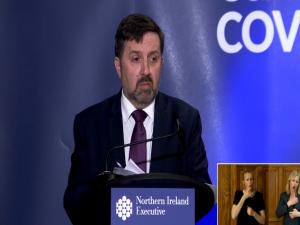
By Q Radio News and PA.
Northern Ireland's health minister has warned of the potential of a second wave of coronavirus.
The region saw a third consecutive day on Tuesday of no new deaths with Covid-19 reported.
However, Robin Swann urged the public to remain vigilant as lockdown restrictions are eased saying coronavirus is "in retreat but we must not turn our back on it".
Earlier the minister announced plans for rebuilding health services while remaining vigilant against a potential second wave of coronavirus.
"We can't rush this, the situation is still finely balanced and we will only get one chance at this phase, so we must proceed gradually step by step," he told the Stormont Executive's briefing.
He said if the virus is managed, any potential second wave may not be as critical as the first, but warned if the health service becomes threatened,"then our only option is to go back into a second lockdown".
With Northern Ireland emerging from restrictions at a slower pace than the Republic of Ireland, Mr Swann said he has asked the Irish government for "more of an engagement" before the next phase "so we can make sure we are on similar pages".
He said he did not want the Northern Ireland Executive in a place "where it seems that we should be playing catch-up where we're not".
Announcing plans to rebuild the health service earlier, Mr Swann said non-Covid-19 related hospital care is down by up to two-thirds in Northern Ireland.
Priorities include some cancer treatments and other urgent conditions.
Mr Swann said: "The scale of the challenge confronting the health and social care system is daunting.
"We need to maximise service activity within the context of managing the ongoing Covid-19 situation."
Planned care was deferred as medical staff were redeployed in March to treat coronavirus-related cases.
The minister told the Assembly: "Those waiting lists were unacceptable before Covid-19 and they are even more horrendous now.
"For instance, outpatient activity is down between 40% and 55%; and inpatient activity by between 34% and 67% - both compared to the similar period last year."
Also appearing at the Executive's briefing on Tuesday evening, the chief executive of the Belfast health trust Dr Cathy Jack said the virus will remain with us "for the foreseeable future".
She said it will change how services are delivered and that the trust will prioritise the most urgent, including red flag cancer surgery, urgent diagnostic tests, urgent day case procedures and reopening some day services that the vulnerable depend on.
Telephone triaging in outpatients will continue as well as virtual and drive-through clinics.
South Eastern Trust director Charlie Martyn said emergency departments are now back to pre-Covid levels in terms of usage, describing them as "very busy", which he said is a challenge.
He said many looked at increasing their size to facilitate social distancing, and even asking minor case patients to wait in their cars for blood test or X-ray results, adding they are "anticipating a second wave".
Mr Swann also earlier said the impact on social care was evident in the presence of Covid-19 among care home residents and staff.
"A recent survey of providers indicates that 19% of those who responded were caring for a resident who had tested positive," he said.
"A slightly higher proportion - 23% of providers - had employees who had tested positive."
Early anecdotal evidence suggests that there are a larger number of mental health presentations previously not known to the system.
The minister said: "These may well be linked with the effects of a reduction of face-to-face contacts and stress related to the pandemic.
"Important projects and programmes being delivered across the department have also been affected.
"For example, only two of my department's New Decade, New Approach priorities are now on target for delivery."
Mr Swann said work on other commitments would be behind schedule.

Robin Swann
He added: "Emerging research indicates that population health is, on balance, likely to be negatively affected by the wider impacts of Covid-19.
"And perhaps the greatest concern is that the most disadvantaged in our society are likely to be worst affected.
"We need to carefully monitor the impacts on population health and consider ways in which we can address them, especially for our most vulnerable citizens."
Health trusts have published plans for scaling up services in the immediate period to June 30.
Three-month blueprints will be made as the country copes with coronavirus infections.


 More than 5,000 NI children set to spend Christmas in temporary accommodation
More than 5,000 NI children set to spend Christmas in temporary accommodation
 No evidence of police collusion in 1978 La Mon bombing
No evidence of police collusion in 1978 La Mon bombing
 Sex offender who targeted girls online across the UK jailed for 27 years
Sex offender who targeted girls online across the UK jailed for 27 years
 Pre-trial rulings due in Bloody Sunday prosecution of Soldier F
Pre-trial rulings due in Bloody Sunday prosecution of Soldier F
 ‘Worst-case scenario’ could delay Belfast maternity hospital by four years
‘Worst-case scenario’ could delay Belfast maternity hospital by four years